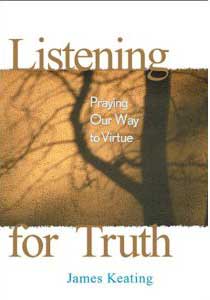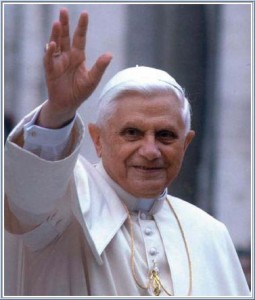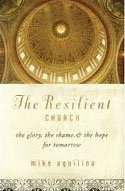Episode 4 – Seeking Truth with Sharon Doran, hosted by Bruce McGregor. Â Ep 4 – John Chapter 1. The Baptism of Jesus. Â The name changing of Simon to Cephas. Â The primacy of Peter. Â The encounter with Nathaniel and the fig tree. Â The branch imagery. Â The calling of us all.
[powerpress]
Sharon Doran serves as the teaching director of “Seeking Truth.†An experienced Bible Study teacher, Sharon has a passion for scripture that will motivate and challenge you to immerse yourself in God’s Word and apply His message to your every day life.
 Episode 4 – Beginning with John Chap 1 v32 Sharon leads us on a reflection of the Baptism of Jesus. The followers of Jesus and renaming of Simon to Cephas (which means “rock”).  The significance of name changing.  The scriptural basis for the primacy of Peter. The encounter with Nathaniel and the importance of the fig tree.  The branch imagery.  The calling of us all.
Episode 4 – Beginning with John Chap 1 v32 Sharon leads us on a reflection of the Baptism of Jesus. The followers of Jesus and renaming of Simon to Cephas (which means “rock”).  The significance of name changing.  The scriptural basis for the primacy of Peter. The encounter with Nathaniel and the importance of the fig tree.  The branch imagery.  The calling of us all.
 “Seeking Truth†is an in depth Catholic Bible Study, commissioned by the Archdiocese of Omaha in response to John Paul II’s call to the New Evangelization as well as Pope Benedict XVI’s exhortation for all Catholics to study scripture. To learn more go to: www.seekingtruth.net
“Seeking Truth†is an in depth Catholic Bible Study, commissioned by the Archdiocese of Omaha in response to John Paul II’s call to the New Evangelization as well as Pope Benedict XVI’s exhortation for all Catholics to study scripture. To learn more go to: www.seekingtruth.net
Tags: baptism of the lord, catholic, catholic podcast, catholic prayer, cathollc spirituality, gospel of john, john the baptist, primacy of peter, Sharon Doran
This entry was posted on Friday, June 17th, 2011 at 7:15 am
You can follow any responses to this entry through the RSS 2.0 feed.
“Lay up for yourselves treasure in heaven”
[powerpress=”daily-scripture”]
an excerpt from today’s reflection by Don Schwager:
Jesus also used the image of eyesight or human vision to convey an important principle of God’s kingdom. Blurred vision and bad eyesight serve as a metaphor for moral stupidity and spiritual blindness. (For examples, see Matthew 15:14, 23:16 ff.; John 9:39-41; Romans 2:19; 2 Peter 1:9; and Revelations 3:17.) Jesus describes the human eye as the window of the “inner being†– the heart, mind, and soul of an individual person. How one views their life and reality reflects not only their personal vision – how they see themselves and the world around them, it also reflects their inner being and soul – the kind of moral person and character they choose for themselves. If the window through which we view life, truth, and reality is clouded, soiled, or marred in any way, then the light of God’s truth will be deflected, diminished, and distorted. Only Jesus Christ can free us from the spiritual darkness of sin, unbelief, and ignorance. That is why Jesus called himself the light of the world – the one true source of light that can overcome the darkness of sin and the lies and deception of Satan.
What can blind or distort our “vision†of what is true, good, lovely, pure, and eternal (Philippians 4:8)? Certainly prejudice, jealousy, and self-conceit can distort our judgment of ourselves and others and lead to moral blindness. Prejudice and self-conceit also destroys good judgment and blinds us to the facts and to their significance for us. Jealousy and envy make us despise others and mistrust them as enemies rather than friends. We need to fearlessly examine ourselves to see if we are living according to right judgment and sound principles or if we might be misguided by blind prejudice or some other conceit. Love is not jealous …but rejoices with the truth (1 Corinthians 13:4-6). Do you live your life in the light of God’s truth?
“Lord Jesus, you have the words of everlasting life. May the light of your truth free me from the error of sin and deception. Take my heart and fill it with your love that I may desire you alone as my Treasure and my All.”
for the full reflection visit : Daily Reading and Meditation
Tags: catholic, catholic podcast, catholic prayer, cathollc spirituality, don schwager, gospel of matthew
This entry was posted on Friday, June 17th, 2011 at 6:11 am
You can follow any responses to this entry through the RSS 2.0 feed.
 Episode 6-Listening For Truth– The difficult stage in moral conversion, not only leaving the sin behind, but also leaving the community of people who desire to hold on to that sin.  It might mean separating from family members, friends, etc, but the hope is that that may possibly follow if we hang in there in that witness of Truth.  Also, life doesn’t stop in our suffering. Many will come who are attracted to the change. How we love those in need will indicate growth even in the crucifixion.  The negative…we reject something, the positive…we embrace something.
Episode 6-Listening For Truth– The difficult stage in moral conversion, not only leaving the sin behind, but also leaving the community of people who desire to hold on to that sin.  It might mean separating from family members, friends, etc, but the hope is that that may possibly follow if we hang in there in that witness of Truth.  Also, life doesn’t stop in our suffering. Many will come who are attracted to the change. How we love those in need will indicate growth even in the crucifixion.  The negative…we reject something, the positive…we embrace something.
[powerpress]
Deacon James Keating, PhD, the director of Theological Formation for the Institute for Priestly Formation, located at Creighton University, in Omaha, is making available to â€Discerning Hearts†and all who listen, his series of programs entitled “Listening For Truthâ€.
Listening for Truth leads men and women in a search for a fuller experience of God that begins in prayer, grows in the rediscovery of our spiritual being, and grounds itself in the truth of Jesus Christ. A presentation of the Christian life as an engagement of the whole person — body, mind, and soul — in the challenge of daily living.
For more information on the “Institute of Priestly Formation†and for other material available by Deacon Keating, just click here
Don’t forget to pickup a copy of “Communion with Christ†, it is one of the best audio sets on prayer…ever!
Check out Deacon Keating’s “Discerning Heart†page
Tags: catholic, catholic podcast, catholic prayer, cathollc spirituality, creighton university, Deacon James Keating, Deacon Keating, institute for priestly formation, moral conversion, theological formation, virtue
This entry was posted on Thursday, June 16th, 2011 at 7:02 am
You can follow any responses to this entry through the RSS 2.0 feed.
“Your Father knows what you need before you ask him”
[powerpress=”daily-scripture”]
an excerpt from today’s reflection by Don Schwager:
Do you pray with joy and confidence? The Jews were noted for their devotion to prayer. Formal prayer was prescribed for three set times a day. And the rabbis had a prayer for every occasion. Jesus warns his disciples against formalism, making prayer something mechanical and devoid of meaning, with little thought for God. When Jesus taught his disciples to pray he gave them the disciple’s prayer, what we call the Our Father or Lord’s Prayer. This prayer dares to call God “our Father†and boldly asks for the things we need to live as his sons and daughters.
It is through the gift of the Holy Spirit that we can know God personally and call him “Abba, Father†(Romans 8:15). We can approach God our Father with confidence and boldness because Jesus Christ has opened the way to heaven for us through his death and resurrection. When we ask God for help, he fortunately does not give us what we deserve. Instead, he responds with grace and favor and mercy. It is his nature to love generously and to forgive mercifully. When he gives he gives more than we need so we will have something to share with others in their need as well.
God is kind and forgiving towards us and he expects us to treat our neighbor the same. Do you treat others as they deserve, or do you treat them as the Lord would treat you with his grace and favor and mercy? Jesus’ prayer includes an injunction that we must ask God to forgive us in proportion as we forgive those who have wronged us. Ask the Lord to free your heart of any anger, bitterness, resentment, selfishness, indifference, or coldness towards others. Let the Holy Spirit fill you with the fire of his burning love and compassion and with the river of his overflowing mercy and kindness.
“Father in heaven, you have given me a mind to know you, a will to serve you, and a heart to love you. Give me today the grace and strength to embrace your holy will and fill my heart with your love that all my intentions and actions may be pleasing to you. Give me the grace to be charitable in thought, kind in deed, and loving in speech towards all.”
for the full reflection visit : Daily Reading and Meditation
Tags: catholic, catholic podcast, catholic prayer, cathollc spirituality, don schwager, gospel of matthew
This entry was posted on Thursday, June 16th, 2011 at 6:17 am
You can follow any responses to this entry through the RSS 2.0 feed.
Episode 6 – St. Bonaventure – The Journey of the Mind into God
[powerpress]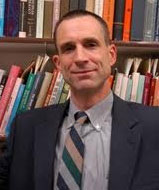
Academic Theology and Contemplative Prayer
“The Journey of the Mind into God” -Â 3 basic phases
1. Seeing God in and through the World (looking outward) (stage 1 & 2) (The Nave)
2. Seeing God in and through the Self (looking inward)(stage 3 & 4) (The Choir)
 3. Seeing God in and through God Himself (looking upward) (stage 5 & 6) (The Altar)
3. Seeing God in and through God Himself (looking upward) (stage 5 & 6) (The Altar)
…and then (stage 7)The Sacrament Himself
Here is the PDF for the work of St. Bonaventure – “The Journey of the Mind into God”
“Christian Apologetics with Dr. R. R. Reno” explores numerous facets of faith and reason in the life of the Church and the world. Grounded on the work of giants, such as St. Thomas Aquinas, St. Bonaventure, Blessed John Newman, soon-to-be Blessed John Paul II, G. K. Chesterton, Blaise Pascal and Stephen Barr, Dr. Reno helps us to open our minds to make the journey to our hearts.
R. R. Reno is the editor at First Things: A Journal of Religion, Culture, and Public Life, and Professor of Theology, currently on leave from Creighton University. His theological work has been published in many academic journals. Essays and opinion pieces on religion, public life, contemporary culture, and current events have appeared in Commentary, and the Washington Post. In Fighting the Noonday Devil Reno suggests that putting ourselves at the disposal of what is real is what trains us for true piety. His other recent books include Genesis: Brazos Theological Commentary on the Bible and Sanctified Vision: An Introduction to Early Christian Interpretation of the Bible.
Tags: catholic, catholic podcast, catholic prayer, cathollc spirituality, creighton university, Dr. R. R. Reno, first things, fraciscan spirituaity, st. bonaventure
This entry was posted on Wednesday, June 15th, 2011 at 9:30 pm
You can follow any responses to this entry through the RSS 2.0 feed.
T
THE POWER OF INTERCESSION: THE PROPHET ELIJAH’S PRAYER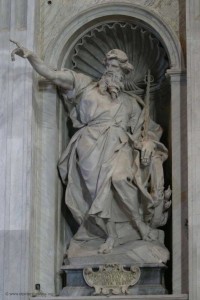
VATICAN CITY, 15 JUN 2011 (VIS) – In his general audience, held this morning in St. Peter’s Square, the Pope resumed his series of catecheses dedicated to the subject of prayer, focusing today on the Prophet Elijah “whom God sent to bring the people to conversion”.
The Holy Father explained how “upon Mount Carmel Elijah revealed himself in all his power as intercessor when, before the whole of Israel, he prayed to the Lord to show Himself and convert people’s hearts. The episode is recounted in chapter 18 of the First Book of Kings”.
“The contest between Elijah and the followers of Baal (which was, in fact, a contest between the Lord of Israel, God of salvation and life, and a mute and ineffective idol which can do nothing for either good or evil) also marked the beginning of a confrontation between two completely different ways to address God and to pray”. The oblations of the prophets of Baal “revealed only the illusory reality of the idol … which closed people in the confines of a desperate search for self”.
On the other hand, Elijah “called on the people to come closer, involving them in his actions and his prayer. … The prophet built an alter using ‘twelve stones, according to the number of the tribes of the sons of Jacob’, … to represent all Israel. … Elijah then addressed the Lord calling Him Lord of the fathers, thus implicitly recalling the divine promises and the history of choice and alliance which had indissolubly united the Lord to His people”.
 The prophet’s request “was that the people might finally and fully come to know and understand Who their God is, and make the decisive decision to follow only Him. Only in this way could God be recognised as Absolute and Transcendent”. Only in this way would it be clear that “no other gods could be placed at His side, as this would deny His absoluteness and relativize Him”.
The prophet’s request “was that the people might finally and fully come to know and understand Who their God is, and make the decisive decision to follow only Him. Only in this way could God be recognised as Absolute and Transcendent”. Only in this way would it be clear that “no other gods could be placed at His side, as this would deny His absoluteness and relativize Him”.
Benedict XVI highlighted how
“believers must respond to the absoluteness of God with absolute and total love, a love involving all their lives, their energies, their hearts. … In his intercession, Elijah asked of God what God Himself wished to do: to show Himself in all His mercy, faithful to His nature as Lord of life Who forgives, converts and transforms”.
“The Lord responded unequivocally, not only burning the offering but even consuming all the water that had been poured around the altar. Israel could no longer doubt: divine mercy had responded to its weakness, to its doubts, to its lack of faith. Now Baal, the vain idol, was beaten and the people, who seemed lost, had rediscovered the way of truth, they had rediscovered themselves“.
The Holy Father concluded by asking himself what this story has to tell us today.
“Firstly”, he said, “is the priority of the first commandment of God’s Law: having no god but God. When God disappears man falls into slavery, into idolatry, as has happened in our time under totalitarian regimes and with the various forms of nihilism which make man dependent on idols and idolatry, which enslave”. Secondly, he continued, “the main objective of prayer is conversion: the fire of God which transforms our hearts and makes us capable of seeing God and living for Him and for others”. Thirdly, “the Church Fathers tell us that this story is … a foretaste of the future, which is Christ. It is a step on the journey towards Christ”.
AG/ VIS 20110615 (590)
Published by VIS – Holy See Press Office – Wednesday, June 15, 2011
Tags: catholic, catholic podcast, catholic prayer, cathollc spirituality, elijah, intercession, pope benedict xvi, prayer
This entry was posted on Wednesday, June 15th, 2011 at 9:10 am
You can follow any responses to this entry through the RSS 2.0 feed.
“Love your enemies and pray for those who persecute you”
[powerpress=”daily-scripture”]
an excerpt from today’s reflection by Don Schwager:
Why did Jesus single out prayer, fasting, and almsgiving for his disciples? The Jews considered these three as the cardinal works of the religious life. These were seen as the key signs of a pious person, the three great pillars on which the good life was based. Jesus pointed to the heart of the matter. Why do you pray, fast, and give alms? To draw attention to yourself so that others may notice and think highly of you? Or to give glory to God? The Lord warns his disciples of self-seeking glory – the preoccupation with looking good and seeking praise from others. True piety is something more than feeling good or looking holy. True piety is loving devotion to God. It is an attitude of awe, reverence, worship and obedience. It is a gift and working of the Holy Spirit that enables us to devote our lives to God with a holy desire to please him in all things (Isaiah 11:1-2).
What is the sure reward which Jesus points out to his disciples? It is communion with God our Father. In him alone we find the fulness of life and happiness, truth and beauty, love and joy. Saint Augustine, the great fourth century bishop of Hippo, wrote the following prayer in his Confessions:Â When I am completely united to you, there will be no more sorrows or trials; entirely full of you, my life will be complete. The Lord rewards those who seek him with humble and repentant hearts. He renews us each day and he gives us new hearts of love and compassion that we may serve him and our neighbor with glad and generous hearts. Do you want to grow in your love for God and for your neighbor? Seek him expectantly in prayer, with fasting, and in generous giving to those in need.
“Lord Jesus, give me a lively faith, a firm hope, a fervent charity, and a great love for you. Take from me all lukewarmness in meditating on your word, and dullness in prayer. Give me fervor and delight in thinking of you and your grace. Fill my heart with compassion for others, especially those in need, that I may respond with generosity.â€
for the full reflection visit : Daily Reading and Meditation
Tags: catholic, catholic podcast, catholic prayer, cathollc spirituality, don schwager, gospel of matthew
This entry was posted on Wednesday, June 15th, 2011 at 5:27 am
You can follow any responses to this entry through the RSS 2.0 feed.
[powerpress = “vatican-radio”]
EVANGELISATION IS A TASK FOR ALL MEMBERS OF THE CHURCH
VATICAN CITY, 14 JUN 2011 (VIS) – Yesterday at 7.30 p.m. in the Roman basilica of St. John Lateran Benedict XVI inaugurated an ecclesial congress marking the close of the pastoral year of the diocese of Rome. The congress, which will run from 13 to 15 June, has as its theme: “The joy of engendering the faith in the Church of Rome”.
Commenting on the choice of theme, the Pope affirmed that “the faith cannot endure by itself in the world, it is not automatically transmitted to men’s hearts but always has to be announced. And the announcement of the faith, in order to be effective, must come from a heart that believes, that hopes, that loves, a heart that adores Christ and believes in the power of the Holy Spirit. … The response of faith arises when, by God’s grace, man discovers that believing means finding true life, the ‘full life'”.
The Holy Father highlighted the fact that
“the Church, each one of us, must bring the world the good news that Jesus is Lord, the One in Whom God’s closeness and love for each man and woman became flesh. This announcement must resound anew in regions of ancient Christian tradition”. In this context the Pope recalled words he had pronounced at World Youth Day 2005 in Cologne, Germany: “The happiness you seek, the happiness you have the right to enjoy, has a name and a face: Jesus of Nazareth, concealed in the Eucharist.
“If mankind forgets God”, he added, “this is also because Jesus is often reduced to the status of a wise man, and His divinity is diminished if not denied outright. This way of thinking makes it impossible to comprehend the radical novelty of Christianity, because if Jesus is not the only Son of the Father, then God did not enter into the history of mankind. The truth is that the incarnation is at the very heart of the Gospel. May we, then, show increasing commitment to renewing evangelisation, which is a task not just for the few but for all the members of the Church“.
“Should we too not share the beauty and reason of the faith, and carry the light of God to the men and women of our time with courage, conviction and joy?” Pope Benedict asked. “Many are the people who have not yet met the Lord; they must be given our special pastoral attention. … Today this is more urgent than ever and requires us to commit ourselves trustingly, upheld by the certainty that the grace of God always works on the heart of man”.
Tags: catholic, catholic podcast, catholic prayer, cathollc spirituality, discerning heart, new evangelization, pope benedict xvi, vatican radio
This entry was posted on Wednesday, June 15th, 2011 at 5:10 am
You can follow any responses to this entry through the RSS 2.0 feed.
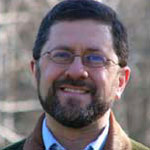 Episode 6– Crusades Abroad and at Home
Episode 6– Crusades Abroad and at Home
The Resilient Church with Mike Aquilina, offers a fascinating look at the trials and triumphs of the Catholic Church over the past two thousand years. Fast-paced sketches of critical periods in church history give readers perspective on the challenges faced by the church today. Mike Aquilina does not shrink from the realities of the past, including badly behaved leaders and those who betrayed the Lord. Yet he also leaves us all with well-founded hope for the future: God remains faithful in every circumstance and fulfills his promise to remain with his church always. Hosted by Kris McGregor
Also visit Mike’s “Discerning Hearts†page for more audio downloads and information!
Tags: catholic, catholic podcast, catholic prayer, cathollc spirituality, church history, crusades, mike aquilina, Resilient Church, st. paul center for biblical theology
This entry was posted on Tuesday, June 14th, 2011 at 8:34 pm
You can follow any responses to this entry through the RSS 2.0 feed.
“Love your enemies and pray for those who persecute you”
[powerpress feed=”daily-scripture”]
an excerpt from today’s reflection by Don Schwager:
What makes Christians different from others and what makes Christianity distinct from any other religion? It is grace — treating others, not as they deserve, but as God wishes them to be treated — with loving-kindness and mercy. God is good to the unjust as well as the just. His love embraces saint and sinner alike. God seeks our highest good and teaches us to seek the greatest good of others, even those who hate and abuse us. Our love for others, even those who are ungrateful and selfish towards us, must be marked by the same kindness and mercy which God has shown to us. It is easier to show kindness and mercy when we can expect to benefit form doing so. How much harder when we can expect nothing in return. Our prayer for those who do us ill both breaks the power of revenge and releases the power of love to do good in the face of evil. How
can we possibly love those who cause us harm or ill-will? With God all things are possible. He gives power and grace to those who believe and accept the gift of the Holy Spirit. His love conquers all, even our hurts, fears, prejudices and griefs. Only the cross of Jesus Christ can free us from the tyranny of malice, hatred, revenge, and resentment and gives us the courage to return evil with good. Such love and grace has power to heal and to save from destruction. Do you know the power of Christ’s redeeming love and mercy?
Was Jesus exaggerating when he said we must be perfect as our heavenly Father is perfect? The original meaning of “perfect†in Aramaic is “completeness†or “wholeness–not lacking in what is essentialâ€. God gives us every good gift in Jesus Christ so that we may not lack anything we need to do his will and to live as his sons and daughters. He knows our frailty and sinfulness better than we do. And he assures us of his love, mercy, and grace to follow in his ways. Do you want to grow in your love for
God and for your neighbor? Ask the Holy Spirit to change and transform you in the image of the Father that you may walk in the joy and freedom of the gospel.
“Lord, your love brings freedom and pardon. Fill me with your Holy Spirit and set my heart ablaze with your love that nothing may make me lose my temper, ruffle my peace, take away my joy, nor make me bitter towards anyone.â€
for the full reflection visit : Daily Reading and Meditation
Tags: catholic, catholic podcast, catholic prayer, cathollc spirituality, don schwager, gospel of matthew
This entry was posted on Tuesday, June 14th, 2011 at 7:01 am
You can follow any responses to this entry through the RSS 2.0 feed.
“But I say to you, offer no resistance to one who is evil”
[powerpress feed=”daily-scripture”]
an excerpt from today’s reflection by Don Schwager:
When Jesus spoke about God’s law, he did something no one had done before. He gave a new standard based not just on the requirements of righteousness (i.e. giving each his due), but based on the law of grace and love. Jesus knew the law and its intention better than any jurist or legal expert could imagine. He quoted from the oldest law in the world: If any harm follows, then you shall give life for life, eye for eye, tooth for tooth, hand for hand, foot for foot, burn for burn, wound for wound, stripe for stripe (Exodus 21:23-25). Such a law today seems cruel, but it was meant to limit vengeance as a first step towards mercy.  This law was not normally taken literally but served as a guide for a judge in a law court for assessing punishment and penalty (see Deuteronomy 19:18). The Old Testament is full of references to the command that we must be merciful: You shall not take vengeance or bear any grudge against the sons of your own people, but you shall love your neighbor as yourself: I am the LORD (Leviticus 19:18). If your enemy is hungry, give him bread to eat; and if he is thirsty, give him water to drink (Proverbs 25:21). Do not say, “I will do to him as he has done to me; I will pay the man back for what he has done” (Proverbs 24:29). Let him give his cheek to the smiter, and be filled with insults Lamentations 3:30).
Jesus does something quite remarkable and unheard of. He transforms the law of mercy with grace and loving-kindness. Jesus also makes clear that there is no room for retaliation. We must not only avoid returning evil for evil, but we must seek the good of those who wish us ill. Do you accept insults, as Jesus did, with no resentment or malice? When you are compelled by others to do more than you think you deserve, do you insist on your rights, or do you respond with grace and cheerfulness?
“O merciful God, fill our hearts, we pray, with the graces of your Holy Spirit; with love, joy, peace, patience, gentleness, goodness, faithfulness, humility, and self-control. Teach us to love those who hate us; to pray for those who despitefully use us; that we may be the children of your love, our Father, who makes the sun to rise on the evil and the good, and sends rain on the just and on the unjust. In adversity grant us grace to be patient; in prosperity keep us humble; may we guard the door of our lips; may we lightly esteem the pleasures of this world, and thirst after heavenly things; through Jesus Christ our Lord. (Prayer of Anselm, 1033-1109)
for the full reflection visit : Daily Reading and Meditation
Tags: catholic, catholic podcast, catholic prayer, cathollc spirituality, don schwager, gospel of matthew
This entry was posted on Monday, June 13th, 2011 at 6:06 am
You can follow any responses to this entry through the RSS 2.0 feed.
Tags: archdiocese of washington dc, catholic, catholic podcast, catholic prayer, cathollc spirituality
This entry was posted on Sunday, June 12th, 2011 at 7:13 am
You can follow any responses to this entry through the RSS 2.0 feed.
Episode 3 – Seeking Truth with Sharon Doran, hosted by Bruce McGregor. Â Ep 3 – “The Word become flesh and made His dwelling among us…” Â continuing The Prologue to the Holy Gospel According to St. John.
According to St. John.
[powerpress]
Sharon Doran serves as the teaching director of “Seeking Truth.†An experienced Bible Study teacher, Sharon has a passion for scripture that will motivate and challenge you to immerse yourself in God’s Word and apply His  message to your every day life.
message to your every day life.
Episode 3 – Continuing the Prologue to the Gospel According to St. John. Â Sharon and Bruce begin with John chap 1 v 14 Â “The Word became flesh and made his dwelling among us…” They discuss the greatness and humility of John the Baptist. Â What it was like to be a Jew in the first century. Â Where was Jesus really baptized (think you know?) “The Lamb of God”…what does this mean?
 “Seeking Truth†is an in depth Catholic Bible Study, commissioned by the Archdiocese of Omaha in response to John Paul II’s call to the New Evangelization as well as Pope Benedict XVI’s exhortation for all Catholics to study scripture. To learn more go to: www.seekingtruth.net
“Seeking Truth†is an in depth Catholic Bible Study, commissioned by the Archdiocese of Omaha in response to John Paul II’s call to the New Evangelization as well as Pope Benedict XVI’s exhortation for all Catholics to study scripture. To learn more go to: www.seekingtruth.net
Tags: baptism of jesus, catholic, catholic podcast, catholic prayer, cathollc spirituality, gospel of john, john the baptist, lamb of god
This entry was posted on Friday, June 10th, 2011 at 9:10 am
You can follow any responses to this entry through the RSS 2.0 feed.
“Do you love Jesus more than these?“
[powerpress feed=”daily-scripture”]
an excerpt from today’s reflection by Don Schwager:
Do you want the fire of God’s love to burn in your heart? John the evangelist tells us that God is love (1 John 4:16). His love is unconditional, unmerited, and without limit. It lasts forever. It’s the beginning and the end – it’s the reason God created us and why he wants us to be united with him. And it’s the essence of what is means to be a Christian – one who knows God’s love and forgiveness and who loves God in return with all one’s heart, soul, mind, body, and strength (Deuteronomy 6:5, Luke 10:27, Mark 12:33). God’s love heals and transforms our lives and frees us from fear, selfishness, and greed. It draws us to the very heart of God and it compels us to give to him the best we have and all we possess – our gifts, our time, our  resources, our full allegiance, and our very lives. Paul the Apostle tells us that God’s love has been poured into our hearts through the Holy Spirit which has been given us (Romans 5:5). What can quench such love? Certainly indifference, loss of hope, disbelief, and rejection of God and his word.
resources, our full allegiance, and our very lives. Paul the Apostle tells us that God’s love has been poured into our hearts through the Holy Spirit which has been given us (Romans 5:5). What can quench such love? Certainly indifference, loss of hope, disbelief, and rejection of God and his word.
Why did Jesus question Peter’s love and fidelity three times in front of the other apostles? It must have caused Peter pain and sorrow since he had publicly denied Jesus three times. Now Peter, full of remorse and humility, unequivocally stated that he loved his master and was willing to serve him whatever it might cost. When Jesus asks him “do you love me more than these?” Jesus may have pointed to the boats, nets and catch of fish. He may have challenged Peter to abandon his work as a fisherman for the task of shepherding God’s people. Jesus also may have pointed to the other disciples and to Peter’s previous boast: “Though they all fall away because of you, I will never fall away” (Matthew 26:33). Peter now makes no boast or comparison but humbly responds: “You know I love you.”
“Lord Jesus, inflame my heart with your love and remove everything that is unloving, unkind, ungrateful, unholy, and not in accord with your will.”
for the full reflection visit : Daily Reading and Meditation
Tags: catholic, catholic podcast, catholic prayer, cathollc spirituality, don schwager, gospel of john
This entry was posted on Friday, June 10th, 2011 at 5:58 am
You can follow any responses to this entry through the RSS 2.0 feed.
 Episode 5 -Listening For Truth– The Reality of Our Conscience.  What it is and what it isn’t.  The importance of proper formation…through the sacramental life, the Catechism of the Church and Sacred Scripture.  “Follow the Truth” is the beginning of the conversation, not “follow your conscience” in order to make the sacred decision.  Not to be passive but teachable is the goal.  The Marian deposition is the the model for moral formation.  Conscience is the judgement of the mind as it listens to the voice of Christ through the lives of the saints, the sacraments, the Catechism and Scripture in prayer.
Episode 5 -Listening For Truth– The Reality of Our Conscience.  What it is and what it isn’t.  The importance of proper formation…through the sacramental life, the Catechism of the Church and Sacred Scripture.  “Follow the Truth” is the beginning of the conversation, not “follow your conscience” in order to make the sacred decision.  Not to be passive but teachable is the goal.  The Marian deposition is the the model for moral formation.  Conscience is the judgement of the mind as it listens to the voice of Christ through the lives of the saints, the sacraments, the Catechism and Scripture in prayer.
[powerpress]
Deacon James Keating, PhD, the director of Theological Formation for the Institute for Priestly Formation, located at Creighton University, in Omaha, is making available to â€Discerning Hearts†and all who listen, his series of programs entitled “Listening For Truthâ€.
Listening for Truth leads men and women in a search for a fuller experience of God that begins in prayer, grows in the rediscovery of our spiritual being, and grounds itself in the truth of Jesus Christ. A presentation of the Christian life as an engagement of the whole person — body, mind, and soul — in the challenge of daily living.
For more information on the “Institute of Priestly Formation†and for other material available by Deacon Keating, just click here
Don’t forget to pickup a copy of “Communion with Christ†, it is one of the best audio sets on prayer…ever!
Check out Deacon Keating’s “Discerning Heart†page
Tags: catholic, catholic podcast, catholic prayer, cathollc spirituality, Church and Sacred Scripture, conscience, creighton university, Deacon James Keating, Deacon Keating, institute for priestly formation
This entry was posted on Thursday, June 9th, 2011 at 8:50 am
You can follow any responses to this entry through the RSS 2.0 feed.



